Ranking high in Google’s search results is the primary goal of any SEO strategy. It’s the difference between a thriving online presence and one that’s lost in the digital noise. Achieving a top rank requires a deep understanding of Google’s ranking factors and a disciplined, long-term approach to optimization. The key is to provide the best possible answer to a user’s search query.
The Pillars of Ranking Success
A successful SEO strategy is built on three core pillars: on-page SEO, off-page SEO, and technical SEO. Each plays a crucial role in telling Google that your site is the most valuable resource for a given query.
On-Page SEO
This refers to all the optimizations you make directly on your website to improve its ranking.
- Keyword Strategy: Don’t just stuff keywords; integrate them naturally into your titles, headings, and body content. Aim to satisfy user intent.
- Content Quality: Create comprehensive, in-depth content that covers a topic thoroughly. A well-written article that answers all potential questions is more likely to rank higher.
- User Experience (UX): A positive UX—fast load times, easy navigation, and mobile-friendliness—is a direct ranking factor. Google rewards sites that provide a smooth experience for visitors. “
Off-Page SEO
These are actions taken outside of your website to impact your rankings.
- Backlinks: Backlinks from high-authority websites are a strong signal of credibility. Focus on earning quality links, not just quantity.
- Brand Mentions: Mentions of your brand on other sites, even without a link, can contribute to your authority.
Technical SEO
This focuses on the “backend” of your website, ensuring it’s structured for search engines.
- Crawlability & Indexing: As noted in the previous article, ensuring Google can easily crawl and index your site is fundamental.
- Core Web Vitals: These are a set of metrics from Google that measure a site’s loading speed, interactivity, and visual stability. Improving these signals can lead to better rankings.
Q&A: Your Questions Answered
Q: Do I need to update my content to maintain my rankings? A: Yes, regularly updating and refreshing your content with new information or a new perspective can help you maintain and even improve your rankings. This shows Google that your content is current and relevant.
Q: How important are social media signals for ranking? A: While social shares are not a direct ranking factor, a strong social media presence can increase traffic, generate brand awareness, and lead to more natural backlinks, all of which indirectly contribute to higher rankings.


